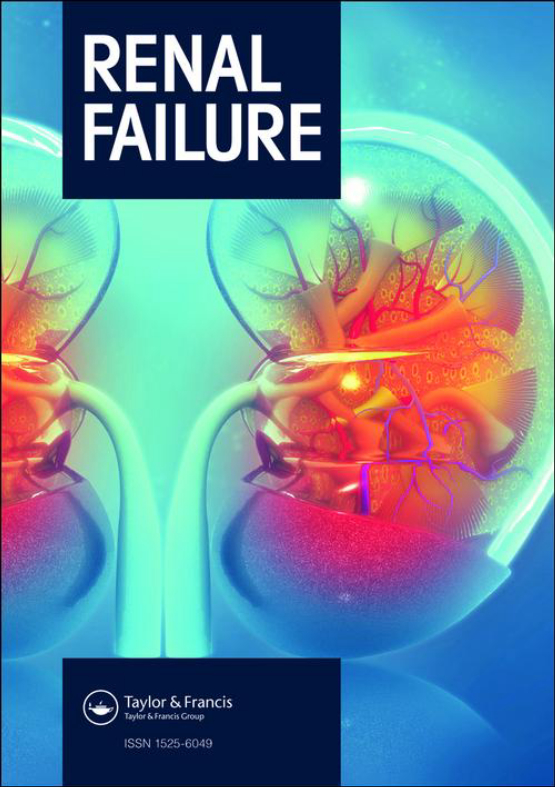Submit a Manuscript to the Journal
Renal Failure
For an Article Collection on
Lessons Learned: Management of Acute Kidney Injury during COVID-19
Manuscript deadline
31 October 2024


Article collection guest advisor(s)
Prof. Bijin Thajudeen ,
Banner University of Arizona Medical center, USA
Prof. Iyad Mansour ,
Banner University of Arizona, USA
Prof. Swetha Rani Kanduri ,
Ochsner Medical Centre, USA
Lessons Learned: Management of Acute Kidney Injury during COVID-19
COVID-19 has been associated with a higher incidence of acute kidney injury, which adds complexity to the management of patients. Patients with AKI often experience more severe disease outcomes. Based on the current evidence, it is essential to have a well-structured framework for managing and supporting patients with acute kidney injury. This includes therapeutics, infection mitigation strategies, resource allocation plans, and support systems for nephrology healthcare workers. The ongoing research and experience gained during the pandemic will continue to shape the management of kidney disease in the context of infectious diseases and other public health emergencies. In this Article Collection, our goal is to consolidate current knowledge on COVID-19-associated kidney injury and propose recommendations for its diagnosis and treatment. We welcome articles of any type that align with Renal Failure's author guidelines. Potential topics include, but are not limited to, the following:
- AKI and newer insights into pathophysiology: The pathophysiology of renal involvement appears to be either a direct consequence of viral infection or an indirect process resulting from downstream disease implications.
- AKI and impact of COVID-19 therapeutics: The treatment COVID 19 follow same practice guidelines for the general management of AKI given the heterogeneous nature of potential AKI causes. Drugs used in the treatment of COVID 19 has impact on renal function.
- AKI and utilization of healthcare resources, including renal replacement therapy: Intensive care units and dialysis units have faced challenges in resource allocation, staffing, and maintaining adequate supplies. In addition, they had to implement strict infection control measures to protect vulnerable patients.
- AKI and Healthcare Disparities: COVID-19 has highlighted healthcare disparities, including access to care, socioeconomic factors, and racial disparities. These disparities have been particularly evident in the kidney disease population.
- AKI and Impact on Healthcare Policies: The pandemic has necessitated rapid changes in healthcare policies and guidelines, impacting the delivery of kidney care. Flexibility in policy adjustments has been crucial to adapt to evolving circumstances.
- Patient perspective and AKI: Patients with kidney disease have experienced fear, uncertainty, and challenges in accessing care and support during the pandemic. Their perspectives and needs have been central to guiding healthcare responses.
Keywords: AKI, COVID-19, Therapeutics, Pathophysiology, Resource utilization
Guest Advisors
Prof. Bijin Thajudeen M.D. is an Associate Professor at the Division of Nephrology of the Banner University of Arizona Medical Center, USA. He is also an associate director of Nephrology clinical research at Banner University of Arizona. His research interests are AKI and critical care nephrology. He has a special interest in COVID-19 and its renal complications.
Prof. Iyad Mansour M.D. completed his fellowship in Nephrology from the Banner University of Arizona. He is currently an Assistant Professor at the Banner University of Arizona. His research interests include glomerulonephritis, electrolytes disturbance and diabetic kidney disease.
Prof. Swetha Rani Kanduri M.D. completed his residency from University of Alabama and pursued Nephrology Fellowship from University of Mississippi Medical Centre. He is currently an Assistant Professor working at Ochsner Health, New Orléans. He also serves as an Associate Program Director for the nephrology fellowship program at the Ochsner Health. His research interests are in fields of Onco-Nephrology, AKI, and Glomerular diseases.
Disclosure statement: Guest Advisors declare there is no conflict of interest.
All manuscripts submitted to this Article Collection will undergo a full peer-review; the Guest Advisor for this Collection will not be handling the manuscripts (unless they are an Editorial Board member).
Please review the journal scope and author submission instructions prior to submitting a manuscript.
The deadline for submitting manuscripts is October 31st, 2024.
Please contact Ruby Ru at [email protected] with any queries and discount codes regarding this Article Collection.
To submit your papers to this Article Collection, please:
- Check "yes" for the question, "Are you submitting your paper for a specific special issue or article collection?"
- Select the relevant Article Collection from the drop-down menu under the question, "Special Issue or Article Collection Name."
Benefits of publishing open access within Taylor & Francis
Global marketing and publicity, ensuring your research reaches the people you want it to.
Article Collections bring together the latest research on hot topics from influential researchers across the globe.
Rigorous peer review for every open access article.
Rapid online publication allowing you to share your work quickly.
Looking to Publish your Research?
Find out how to publish your research open access with Taylor & Francis Group.
Choose open accessSubmission Instructions
All manuscripts submitted to this Article Collection will undergo desk assessment and peer-review as part of our standard editorial process. Guest Advisors for this collection will not be involved in peer-reviewing manuscripts unless they are an existing member of the Editorial Board. Please review the journal Aims and Scope and author submission instructions prior to submitting a manuscript.